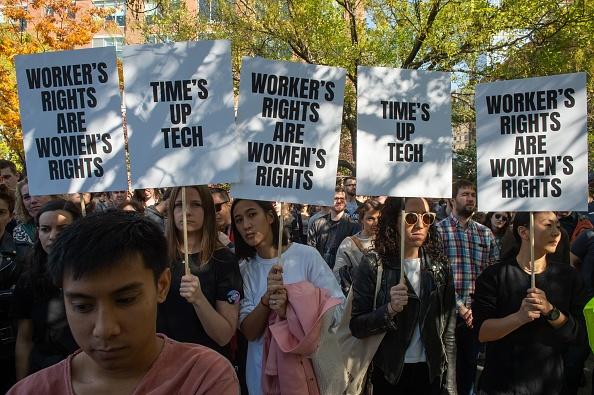This article was originally published on 07/22/2019
Over the past decade, the world’s biggest tech companies have infiltrated every part of our lives, so much so, that it can be nearly impossible to boycott a company when they do things we don’t agree with. For example, Amazon is no longer just an online retail store, its servers also run popular sites like Reddit and Netflix. Meanwhile, Google — a site most people use just about every day — is more than just a search engine, it owns Youtube, Nest, and a host of other companies.
When looking at everything tech companies are involved in, organizing to force change can seem hopeless. After all, it’s hard to boycott any one company completely because they seem to have their hands in everything, making tech giants seem like an unstoppable force. But over the past few years, we’ve seen a new, unexpected player arise in the fight to hold tech companies accountable — their employees.
Over the past few years, there’s been an increase in tech workers speaking up about social justice issues and forcing their employers to change, proving that no company, no matter how big, can escape accountability.
Most recently, headlines were dominated by news of Amazon workers organizing a strike on one of the company’s busiest sales days of the year, Prime Day. In Minnesota, East African workers at Amazon’s Shakopee warehouse organized the strike in response to poor working conditions, along with rampant anti-Black Islamophobia. The warehouse relies on the labor of East African — predominately Somali — immigrants and refugees, the majority of whom are Muslim. The company even purposefully recruits within Minneapolis’ Cedar-Riverside neighborhood, a Somali hub.
Earlier this year, three Somali women working at the location filed a discrimination complaint against Amazon, alleging that it failed to reasonably accommodate the religious practices of its Muslim employees. The letter noted that the three women were often afraid to take time to break their fasts during Ramadan, pray or perform ablution, or even take bathroom breaks. Fasting during Ramadan in Minnesota can mean that people go without food and drink for upwards of fifteen hours. Workers were still expected to meet Amazon’s “rate” (unpacking and repacking a certain number of products in an hour), which has already been critiqued for being too high.
This is not the first year that Amazon workers in Minnesota have taken action against their employer. In 2018, the workers forced Amazon into negotiations after staging a large protest and walkout on December 14. According to the New York Times, it appeared to be the first time a group in the United States forced Amazon to come to the table. Although the group may not have gotten everything that they wanted right away, the fact that Amazon was forced into negotiations for the first time highlights the power of their actions.
In November, 20,000 Google employees staged a massive walkout in protest of sexual harassment within the company. Following their roles in organizing the walkout, Claire Stapleton and Meredith Whittaker said the company retaliated against them through demotion and taking away their roles. Since then, both employees have left Google, but their drive to organize tech workers remains.
“What began as an experiment — can we apply labor organizing to address tech’s ethical crisis? — became one of the most difficult and gratifying efforts I’ve ever been involved in. Organized tech workers — you! — have emerged as a force capable of making real change, pushing for public accountability, oversight, and meaningful equity. And this right when the world needs it most,” Whittaker wrote in an open letter on Medium.
And that isn’t the first time Googlers have managed to push the company away from dangerous roads. In 2018, employees learned that Google had signed a contract with the Department of Defense known as Project Maven, intending to develop drone warfare. Thousands of employees signed a letter in protest, stating: “We believe that Google should not be in the business of war.” As a result of employee protests, Google ultimately ended its contract.
Tech employees have organized in other companies, too. Last month, Wayfair employees staged a walkout after learning that the company sold furniture to a border control facility.
Before the walkout, Wayfairwalkout, the Twitter account run by the employee organizers, tweeted:
“Wayfair workers couldn’t stomach they were making beds to cage children. They asked the company to stop. CEO said no. Tomorrow, they‘re walking out. This is what solidarity looks like – a reminder that everyday people have real power, as long as we’re brave enough to use it.”
Even if you try to stay away from a particular tech company, their size essentially makes them unavoidable. Part of this is a failure of lawmakers who did not properly regulate tech companies, allowing them to expand rapidly without much oversight.
Real social change has always started at a grassroots level. Tech workers are not only continuing on the legacy of labor organizers who forced their companies to develop better practices, but they are fighting to ensure these companies cannot harm other marginalized communities through the technology they develop.
It’s not an easy battle, but it was never imagined as one. Holding these companies accountable will be a long and often difficult process. As tech workers continue to strike and walk out, it’s important to assist them however you possibly can.

